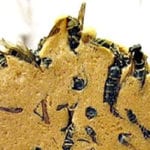 History
History  History
History  Health
Health 10 Everyday Activities That Secretly Alter Consciousness
 History
History Top 10 Historical Disasters Caused by Someone Calling in Sick
 Animals
Animals 10 New Shark Secrets That Recently Dropped
 Movies and TV
Movies and TV 10 Forgotten Realities of Early Live Television Broadcasts
 Technology
Technology 10 Stopgap Technologies That Became Industry Standards
 Weird Stuff
Weird Stuff 10 Wild Facts About Taxidermy That You Probably Didn’t Know
 Travel
Travel 10 Beautiful Travel Destinations (That Will Kill You)
 Miscellaneous
Miscellaneous 10 Modern Marriage Rituals Born from Corporate Branding
 Weird Stuff
Weird Stuff Ten Bizarre Visions of 2026 from Fiction
 History
History 10 “Modern” Problems with Surprising Historical Analogs
 Health
Health 10 Everyday Activities That Secretly Alter Consciousness
 History
History Top 10 Historical Disasters Caused by Someone Calling in Sick
Who's Behind Listverse?

Jamie Frater
Head Editor
Jamie founded Listverse due to an insatiable desire to share fascinating, obscure, and bizarre facts. He has been a guest speaker on numerous national radio and television stations and is a five time published author.
More About Us Animals
Animals 10 New Shark Secrets That Recently Dropped
 Movies and TV
Movies and TV 10 Forgotten Realities of Early Live Television Broadcasts
 Technology
Technology 10 Stopgap Technologies That Became Industry Standards
 Weird Stuff
Weird Stuff 10 Wild Facts About Taxidermy That You Probably Didn’t Know
 Travel
Travel 10 Beautiful Travel Destinations (That Will Kill You)
 Miscellaneous
Miscellaneous 10 Modern Marriage Rituals Born from Corporate Branding
 Weird Stuff
Weird Stuff Ten Bizarre Visions of 2026 from Fiction
10 Most Bizarre Cold Remedies
So you’re feeling achy, sneezy, congested, or queasy due to contracting a cold. In that case, you might want to check out some of these natural albeit bizarre cold remedies with the caveat that they are not necessarily “doctor recommended.”
Let’s explore ten of the most bizarre cold remedies.
Related: 10 Terrible Ideas In Medicine From The Past 100 Years
10 Wet Socks
This cold remedy will literally give you cold feet, which doesn’t sound too enticing when you already have a cold.
Here’s what to do. Take a pair of your socks- preferably cotton or wool as opposed to socks made from synthetic fibers. Soak them in ice-cold water and then wring out the excess water. Pull the socks over your bare feet. Shivers!
Next, pull a dry pair of socks over the wet pair. Climb into bed under the covers, making sure your feet stay warm and snug. When you wake up, you should find that the original wet pair of socks are completely dry in the morning. Doing this wet sock-dry-sock routine supposedly increases your body’s natural immunity while increasing blood circulation to the feet and simultaneously relieving the congestion in your head. Oh, and it also assists with the elimination of waste from the body.
9 Homemade Cough Lozenges
This homemade, natural cold remedy will soothe your sore throat along with your weary soul. It’s no fun to have a bad cough that leaves your throat feeling raw. Follow this recipe, and hopefully, these custom-made lozenges will give you some much-needed relief.
Place a saucepan on a stove burner. Add one cup of white granulated sugar and half a cup of water. Add one teaspoon of fresh lemon juice for a hit of vitamin C, one tablespoon of honey (an antibacterial that soothes a sore throat and acts as a natural cough suppressant). Add one and a half teaspoons of ground ginger (acts as an anti-inflammatory, helps maintain the immune system, and aids with pain relief and nausea). Add 1/4 teaspoon ground cloves (reduces phlegm, has antiseptic properties, and contains antioxidants).
Turn on the burner and stir all the ingredients together thoroughly. Simmer on low for fifteen to twenty minutes. Stir regularly. Meanwhile, cover a cookie sheet with baking parchment. After the ingredients have finished simmering, remove the pan from the burner to allow the mixture to cool. As it cools, it should become a thick syrup.
Next, spoon teaspoons full of syrup onto the parchment about the size of a quarter per lozenge. Space them out so they don’t run together. Let the lozenges set completely. When they’ve hardened, sift powdered sugar over them and mix them around so each lozenge is completely coated. This dusting of confectioner’s sugar keeps the lozenges from sticking to each other.
8 Listening to Music
We all know that music is good for the soul but did you know it’s also good for a cold? Research done by German scientists revealed that listening (to jazz music in particular) reduces stress, which amplifies immunoglobulin levels in the body.
Immunoglobulin is a naturally occurring protein that helps the body defend itself against infection. By listening to jazz, or the second-best type of music- dance music, your antibody levels will rise while cortisol, a stress hormone, decreases. A body in a restful state has a much better chance of coming back into balance from a cold than when it is stressed.
So kick back, put in your earbuds, and lose yourself in the music. Your cold-riddled body will thank you for it.
7 Cupping and Scraping
Cupping, an ancient Chinese healing remedy, on the surface, seems a bizarre remedy for colds. If you’re experiencing congestion due to a cold, then cupping might be a good choice for relieving it. Cupping triggers your body’s energy which helps to restore and heal it.
During an appointment with a practitioner, cups are placed on the skin. Each cup is heated or pumped manually to create suction and then left on the skin for a few minutes.
There are different types of cups. Your practitioner may use edge cups, electric suction cups, Zen clear cups, or oval glass cups. They all essentially do the same thing: massage the skin at a deep level, causing increased blood flow. Increased blood flow detoxes the area where a cup has been applied.
Please note you might react to cupping treatment with a headache, nausea, fatigue, or burns if the cups are overheated before being applied to the skin. But as a rule, cupping is generally pain-free.
Another treatment is scraping, traditionally known as gua sha. The treatment entails running a scraping tool across muscle fibers, myofascial lines, along lymphatic tracks, and the meridians of the body. During a cold, having this kind of treatment can open the skin’s pores and release inflammation in the body.
When you’re feeling miserable and are desperate for some relief, any viable treatment such as this one is worth considering.
6 Make a Poultice
Making and applying a tallow poultice to your chest to relieve congestion is not just an old wives’ tale. This peculiar cold remedy is a combination of an African and European home remedy.
Take rendered cattle or sheep tallow, otherwise known as fat, and gently warm it to soften it. To the tallow, add some herbs. For example, mint aids in clearing up your congestion, while mustard adds a little heat to the poultice. Experiment with the herbs you have in your garden.
Once the tallow and herbs have been mixed, wrap the mixture in a piece of cotton flannel cloth and apply it to the chest.
Another poultice you might want to try making consists of mustard, flour, and water. Simply mix four tablespoons of flour with two tablespoons of dry mustard. Add enough lukewarm water to make a paste. Take a smooth tea towel (not terry cloth) and spread the paste over half the towel on one side. Fold the remaining half of the towel over the paste and apply to the chest. Leave the poultice on the chest for twenty minutes.
Afterward, wipe away any residue from the poultice with a clean, damp cloth. You should apply this mustard poultice once every six hours.
5 Lizard Soup
North American’s have a tradition of serving a cold sufferer warm chicken soup. But in China, lizard soup is served instead.
To simmering water, add a dehydrated lizard along with yams and dates. Cook until yams are soft. It’s reported that this soup reduces coughing and soothes other common cold symptoms. Most importantly, the broth helps to rehydrate the body due to the loss of fluids from repeatedly blowing your nose and sweating, and it aids in loosening built-up mucus.
4 Gogol-Mogol
The phrase “gag me with a spoon” comes to mind when it comes to Gogol-Mogol. Gogol-Mogol is a medicinal hot drink served to citizens in Ukraine and Russia who are inflicted with a cold.
Gogol-Mogol is made by taking one beaten egg yolk and a teaspoon of sweetener – sugar or honey and whisking them together. It’s then added to half a cup of hot milk. Next, dissolve one tablespoon of unsalted butter in the warm mixture.
To make this drink more palatable, you may wish to add a little cognac or rum; of course, this addition is for adults only. It’s believed the egg yolk soothes the throat while the L-tryptophan found in the warm milk helps you to sleep more soundly when stricken with a cold.
3 Onions and Lard
If you’re suffering from a sore throat due to a cold, you might want to slice up a raw onion and stuff it inside your socks! It turns out onions contain allicin. Allicin can reduce inflammation in the body and acts as an antioxidant.
Speaking of socks, here is an old English remedy. Take a pair of dirty socks and wrap them around your neck after first greasing the neck with either rendered chicken fat or lard. Doing this is thought to bring on sweating. And finally, seeing we are on the topic of socks, before putting on a fresh, clean pair of socks, consider rubbing Vicks VapoRub on the bottom of your feet first.
People who use this bizarre cold remedy claim it offers relief from congestion and coughing.
2 Oysters, Anyone?
Oysters are packed with zinc. So if you feel a cold coming on or, better yet, want to build up your zinc levels as cold season approaches, start eating oysters.
The strange thing is that fried and breaded oysters contain more zinc than the raw ones, which is good news for people who don’t have fresh oysters. If you don’t already know it, zinc helps to fight off cold symptoms because zinc aids in the function of our white blood cells. And it’s the white blood cells that fight viral and bacterial infections in the body.
Other sources of food rich in zinc are legumes, so you might think of making a pot of lentil soup. Also, dairy products, spinach, and meat are excellent sources of zinc.
1 Turnips
Who would guess the lowly turnip is an expectorant?
An expectorant aids in quieting coughing and can loosen mucus in the body when sick. Turnips are also loaded with vitamins A, B, and C. In Iran, it’s very common for people suffering from a cold to cook up a plate of turnips, mash them and devour them to reduce their cold symptoms.
Or you may want to try making a turnip concoction to relieve your sore throat or painful, persistent coughing!
Simply peel and cut up a turnip into pieces. Take 150 grams of these pieces and boil them in a pot with a liter of milk. Simmer for a good forty minutes. Strain the liquid off, and let it cool for a bit before drinking it. To make it more palatable, add some honey. This concoction reduces coughing due to a naturally occurring sulfurous ingredient that loosens and eliminates phlegm and disinfects the respiratory tract.
And finally, if eating mashed turnips or drinking milk infused with turnips isn’t appealing, you might prefer a turnip syrup. Make the syrup by first peeling a turnip. Next, cut it into thin slices. In a bowl or plastic container, lay down a slice of turnip, sprinkle on some brown sugar, add another slice of turnip, and so on. Cover the container and let the turnip and sugar sit for twelve hours. Drain off the turnip syrup and store in a bottle. Sip as needed.








